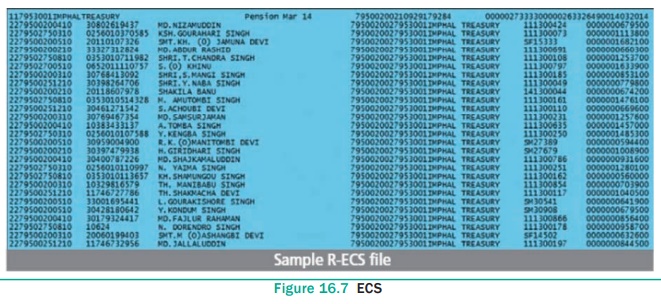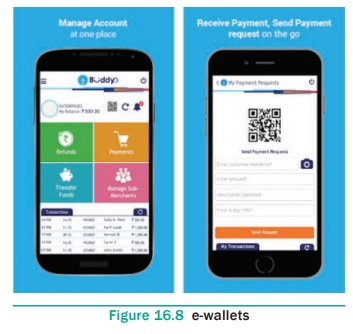Chapter: 12th Computer Applications : Chapter 16 : Electronic Payment Systems
Electronic Account Transfer
Electronic
Account Transfer
Apart from card based payment systems there are
many alternative electronic payment systems. With the advent of computers,
network technologies and electronic communications a large number of
alternative electronic payment systems have emerged. These include ECS
(Electronic Clearing Services), EFT (Electronic funds transfers), Real Time
Gross Settlement system (RTGS) etc. These Electronic Payment systems are used
in lieu of tendering cash in domestic and international transactions.
1. Electronic Clearing Services (ECS)
Electronic Clearing Service can be defined as
repeated transfer of funds from one bank account to multiple bank accounts or
vice versa using computer and Internet technology. The payer instructs the bank
to debit from his bank account and credit it to one or more payee bank account
provided amounts and dates of the payments earlier. This system provides the
convenience of paperless payments.
Advantages of this system are bulk payments,
guaranteed payments and no need to remember payment dates. It can be used by
institutions for making payments such as disbursing of salary, pension or
dividend interest among shareholders. Similarly, individual bank customers also
can make small value repetitive payments such as paying EMI of a loan,
electricity bills, telephone bills, insurance premium, as well as SIP
investments. See Figure 16.7

ECS can be used for both credit and debit purposes
i.e. for making bulk payments or bulk collection of amounts.
● ECS credit: ECS credit is used for making bulk
payment of amounts. In this mode, a single account is debited and multiple
accounts are credited. This type of transactions are Push transactions.Example:
if a company has to pay salary to its 100 employees it can use ECS credit
system than crediting every employees’ account separately.
● ECS debit: ECS debit is an inverse of ECS credit.
It is used for bulk collection of amounts. In this mode, multiple accounts are
debited and then a single account is credited. This type of transactions are
Pull transactions. Example: The insurance premium of bulk number of customers
is debited from customer’s bank account on their prior consent and paid to
insurance company.

EFT is known by a
number of names across countries. In India, it is called as N-EFT (National
Electronic Fund Transfer), in the United States, they may be referred to as
“electronic cheques” or “e-cheques”. National Electronic Funds Transfer (NEFT)
is an electronic funds transfer system initiated by the Reserve Bank of India
(RBI) in November 2005. It is established and maintained by Institute for
Development and Research in Banking Technology (IDRBT). NEFT enables a bank
customer to transfer funds between any two NEFT-enabled bank accounts on a
one-to-one basis. It is done via electronic messages. Unlike RTGS, fund
transfers through the NEFT do not occur in real-time basis.
2. Electronic Funds Transfer
Electronic Funds Transfer (EFT) is the “electronic
transfer” of money over an online network. The amount sent from the sender’s
bank branch is credited to the receiver’s bank branch on the same day in
batches. Unlike traditional processes, EFT saves the effort of sending a demand
draft through post and the inherent delay in reaching the money to the
receiver. Banks may charge commission for using this service. EFT is a widely
used method for moving funds from one account to another in B2B business
models.
3. Real Time Gross Settlement:
Real Time Gross Settlement system (RTGS) is a payment
system particularly used for the settlement of transactions between financial
institutions, especially banks. As name indicates, RTGS transactions are
processed at the real-time. RTGS payments are also called as push payments that
are initiated (“triggered”) by the payer. RTGS payments are generally
large-value payments, i.e. high-volume transactions.
The development and
maintenance of NEFT or RTGS systems worldwide is driven primarily by the
central bank of a country. (RBI in India)
Real-time gross settlement transactions are:
● Unconditional - the beneficiary will receive
funds regardless of whether he fulfills his obligations to the buyer or whether
he would deliver the goods or perform a service of a quality consistent with
the order.
● Irrevocable - a correctly processed transaction
cannot be reversed and its money cannot get refunded (the so-called settlement
finality).
4. Electronic wallets
Electronic wallets (e-wallets) or electronic purses
allow users to make electronic transactions quickly and securely over the
Internet through smartphones or computers. The electronic wallet functions
almost the same as a physical wallet in term that it holds our money.
Electronic wallets were first recognized as a method for storing money in
electronic form, and became popular because it provides a convenient way for
online shopping.
With the development of advanced Internet, the use
of electronic wallets turned out as an efficient transaction tool. This is
evidenced by the many E-Commerce websites that use electronic wallets as a
transaction tool. There are several electronic wallet services that are now
widely used. e.g. :PayPal, SBI Buddy. See Figure 16.8

Related Topics